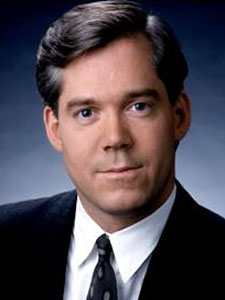Photos
Your Voice
| ||||||||||||||||||||||||
NBC's David Bloom, Edina native, dies while covering war in Iraq
April 6, 2003
 |
| David Bloom, a native of Edina, Minn., lived in the New York area with his wife, Melanie, and three daughters. He played hockey and graduated from Edina High School. (NBC News) |
New York, NY — (AP) NBC News correspondent David Bloom, one of the network's most prominent young stars and a near constant television presence reporting from the Iraqi desert, died Sunday from an apparent blood clot, the network said. The 39-year-old co-anchor of the weekend "Today" show was about 25 miles south of Baghdad and packing gear early in the morning when he suddenly collapsed.
He never regained consciousness and was pronounced dead from a pulmonary embolism after being airlifted to a nearby field medical unit, said Allison Gollust, a spokeswoman for NBC News. She said his death was not combat-related.
Bloom, a native of Edina, Minn., lived in the New York area with his wife, Melanie, and three daughters. Bloom, who played hockey and graduated from Edina High School, was honored with a moment of silence Sunday before the Minnesota Wild-Columbus Blue Jackets game in St. Paul.
Bloom was the second American journalist to die while covering the war. Michael Kelly, editor-at-large for The Atlantic Monthly and a columnist for The Washington Post, was killed Thursday night along with a U.S. soldier when their Humvee plunged into a canal.
Both Bloom and Kelly were traveling with the U.S. Army's 3rd Infantry Division.
NBC News had built a special vehicle, dubbed the "Bloom-mobile," to send strikingly clear pictures of him riding atop a tank through the Iraqi desert. He reported memorably on the sandstorms that briefly delayed American forces.
"He was both a genuinely nice guy and an incredibly tenacious reporter," NBC News President Neal Shapiro said. "He wouldn't be beaten on a story. He always kept us in the game."
From the Iraqi desert, Bloom reported on what the American forces were doing militarily, but he also took the time to convey what their lives were like there, including the meals they were eating and what it was like trying to work in the middle of a sand storm.
"He was a rising star here," Shapiro said.
After attending Pitzer College in Claremont, Calif., Bloom started his career as a reporter for NBC-owned WTVJ in Miami in 1989. He joined NBC News in Chicago in 1993, moving to Los Angeles in 1995.
He became a White House correspondent for NBC in 1997, during the Clinton administration. He reported on presidential races, the O.J. Simpson trial, the Washington-area sniper shooting and the Sept. 11 terrorist attacks.
Former President Clinton said Sunday that Bloom's "integrity and good humor will be missed."
"David Bloom was a smart, energetic professional whose enthusiasm for the job was evident in every question he asked and every story he covered," Clinton said.
Shaken NBC colleagues, including "Today" co-anchor Soledad O'Brien, paid tribute on the network's broadcasts Sunday. "It's a hard morning for all of us," Katie Couric said.
Bloom, who had no apparent health problems, was indefatigable during the Gulf War. He reported at all hours for NBC News broadcasts, and also for the cable outlets MSNBC and CNBC.
On the Monday after the war started, Bloom delivered live reports at 2:22 a.m. ET for MSNBC, at 6:55, 7:09 and 8:04 for "Today," at 10:43 for NBC, 10:47 for MSNBC, 11:12 for NBC, 12:31 p.m. for NBC, 12:36 and 2:33 for MSNBC, at 6:37 for NBC's "Nightly News," and at 8:07 and 9:35 again for MSNBC, according to The Washington Post.
"Given the fact that we're filing at all hours of the day and night, you try to pace yourself and get a little sleep," Bloom told the Post. "You're sleeping with your knees propped up around you."
That may have been a risk factor: blood clots frequently form in legs when they've been immobilized and travel through the body, said Dr. Harold Palevsky, chief of pulmonary critical care with the University of Pennsylvania health system.
Dehydration can also be a factor. Palevsky said Army medics, trained and equipped to stop bleeding, may have been less prepared in the desert for a pulmonary embolism.
ABC News President David Westin said his network was deeply saddened by Bloom's death.
"David was a great journalist and a vigorous competitor; he made all of us better by the standards he set," Westin said. "Our thoughts are with his family, our friends and colleagues at NBC News, and all of our colleagues still in the field."
|
News Headlines
|
Related Subjects
|

